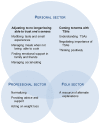Dealing with taste and smell alterations-A qualitative interview study of people treated for lung cancer
- PMID: 29360871
- PMCID: PMC5779655
- DOI: 10.1371/journal.pone.0191117
Dealing with taste and smell alterations-A qualitative interview study of people treated for lung cancer
Abstract
Taste and smell alterations have been recognized as common symptoms in relation to various cancers. However, previous research suggests that patients do not receive sufficient support in managing taste and smell alterations. Therefore, the objective of this study is to investigate how persons with experience from lung cancer-related taste and smell alterations reason about resources and strategies offered and used to manage these symptoms. Data from semi-structured individual interviews with 13 women and four men were analyzed with qualitative content analysis. We used Kleinman's now classic medical anthropological model of local health care systems, consisting of the personal, professional, and folk sector, to interpret and understand how people respond to sickness experiences in their daily lives. By presenting the findings using this model, we demonstrate that most strategies for dealing with taste and smell alterations were undertaken in the personal sector, i.e. in participants' daily lives, on an individual level and in interaction with family, social networks and communities. Taste and smell alterations implied two overarching challenges: 1) adjusting to no longer being able to trust information provided by one's own senses of taste and/or smell, and 2) coming to terms with taste and smell alterations as a part of having lung cancer. Health care professionals' involvement was described as limited, but appeared to fulfil most participants' expectations. However, through provision of normalizing information, practical advice, and to some extent, emotional support, health care professionals had potential to influence strategies and resources used for dealing with taste and smell alterations. With this study, we further the understanding of how people deal with lung cancer-related taste and smell alterations and discuss the role of health care professionals for this process.
Conflict of interest statement
Figures


References
-
- Gamper EM, Zabernigg A, Wintner LM, Giesinger JM, Oberguggenberger A, Kemmler G, et al. Coming to your senses: detecting taste and smell alterations in chemotherapy patients. A systematic review. J Pain Symptom Manage. 2012;44(6):880–95. Epub 2012/08/28. doi: 10.1016/j.jpainsymman.2011.11.011 - DOI - PubMed
-
- Hovan AJ, Williams PM, Stevenson-Moore P, Wahlin YB, Ohrn KE, Elting LS, et al. A systematic review of dysgeusia induced by cancer therapies. Support Care Cancer. 2010;18(8):1081–7. Epub 2010/05/25. doi: 10.1007/s00520-010-0902-1 - DOI - PubMed
-
- Hutton JL, Baracos VE, Wismer WV. Chemosensory dysfunction is a primary factor in the evolution of declining nutritional status and quality of life in patients with advanced cancer. J Pain Symptom Manage. 2007;33(2):156–65. Epub 2007/02/07. doi: 10.1016/j.jpainsymman.2006.07.017 - DOI - PubMed
-
- Koizumi T, Fukushima T, Tatai T, Kobayashi T, Sekiguchi N, Sakamoto A, et al. Successful treatment of crizotinib-induced dysgeusia by switching to alectinib in ALK-positive non-small cell lung cancer. Lung Cancer. 2015;88(1):112–3. Epub 2015/02/14. doi: 10.1016/j.lungcan.2015.01.018 - DOI - PubMed
Publication types
MeSH terms
LinkOut - more resources
Full Text Sources
Other Literature Sources
Medical

